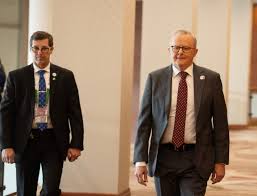Israel-Iran conflict dominates G7 talks as leaders gather in Canada

The G7 Summit in Canada has taken a sharp turn in focus. What was expected to be a forum for discussing economic recovery and climate change is now centered on the growing conflict between Israel and Iran. Leaders from the U.S., U.K., Canada, France, Germany, Italy, and Japan arrived in Quebec to address the most serious Middle East crisis in years.
Recent military exchanges between Israel and Iran have raised fears of a broader regional war. These developments have alarmed G7 leaders, many of whom called for immediate diplomatic intervention. The summit began with urgent closed-door talks about the escalating conflict.
Leaders Voice Deep Concerns
U.S. President Joe Biden warned that Iran’s increasing influence across the region poses a global threat. He cited Iran’s support for militant groups in Lebanon, Syria, Iraq, and Yemen. Biden emphasized that Iran’s suspected nuclear ambitions only add to the danger.
French President Emmanuel Macron stressed unity. “We must act together to stop this conflict from becoming a full-scale war,” he told other leaders. Macron proposed a joint G7 statement urging calm and immediate talks.
German Chancellor Olaf Scholz agreed that pressure on Iran was necessary. But he also emphasized the importance of keeping dialogue open to avoid dangerous misunderstandings.
Push for Immediate Ceasefire
Diplomats from the G7 worked behind the scenes to draft a united response. Sources say the group will likely call for an immediate ceasefire between Israel and Iran-backed forces. The statement is also expected to support Israel’s right to defend itself while urging restraint.
Canadian Prime Minister Justin Trudeau, who is hosting the summit, highlighted humanitarian concerns. “All sides must protect civilians and follow international law,” Trudeau said. He urged all nations involved to de-escalate tensions quickly.
Biden Faces Political Pressure
Back in the U.S., President Biden is facing growing political pressure. Republicans want him to take a tougher stance against Iran. They argue that Iran is supplying weapons to groups like Hezbollah and the Houthis. Meanwhile, progressive Democrats warn that too much support for Israel could hurt America’s image abroad.
This split is also affecting how G7 allies view U.S. policy. Many leaders at the summit are navigating their own domestic debates about the conflict.
Iran Responds with Defiance
Iran’s leaders have strongly rejected Western criticism. Officials in Tehran accused the G7 of siding with Israel. They warned that continued “aggression” would trigger a firm response.
Despite Iran’s denials, G7 members shared intelligence reports showing increased Iranian military activity. This includes the transfer of weapons to allied militias in Lebanon and Syria. These reports have strengthened calls within the G7 for a coordinated response.
Exploring Diplomatic Avenues
Some G7 leaders proposed involving neutral countries in peace talks. Qatar and Oman are seen as potential mediators. Both nations have past experience in calming tensions between Iran and the West.
Japan’s Prime Minister Fumio Kishida suggested forming a special G7 working group focused on Middle East peace. He noted that Japan maintains diplomatic ties with both Iran and Israel, which could help build trust on both sides.
There was also discussion about reviving the 2015 Iran nuclear deal, known as the JCPOA. Leaders believe that framework could help open broader talks about regional security.
Economic Risks Raise Alarm
The conflict’s impact on the global economy was another key concern. Oil prices have surged in recent weeks, driven by fears of disruption in the Strait of Hormuz. This narrow waterway carries a fifth of the world’s oil supply.
European countries are especially vulnerable to energy shocks. Italian Prime Minister Giorgia Meloni warned that a new oil crisis could derail recovery efforts. She called for more energy diversification and emergency planning.
Developing nations may also feel the pinch. Rising fuel and food costs could deepen existing crises in parts of Africa and Asia.
What Lies Ahead?
The G7 Summit will continue through the weekend. Leaders are expected to release a final statement by Sunday. While there is general agreement on the need to de-escalate, differences remain on strategy.
Some countries favor increased sanctions on Iran. Others are pushing for renewed diplomacy. Still, the summit has clearly signaled that the Israel-Iran conflict is now a global issue — not just a regional one.
As one European diplomat put it, “We can no longer treat this as someone else’s war. The ripple effects are already reaching us all.”This summit is a stark reminder that the fires of the Middle East never stay contained for long.”






